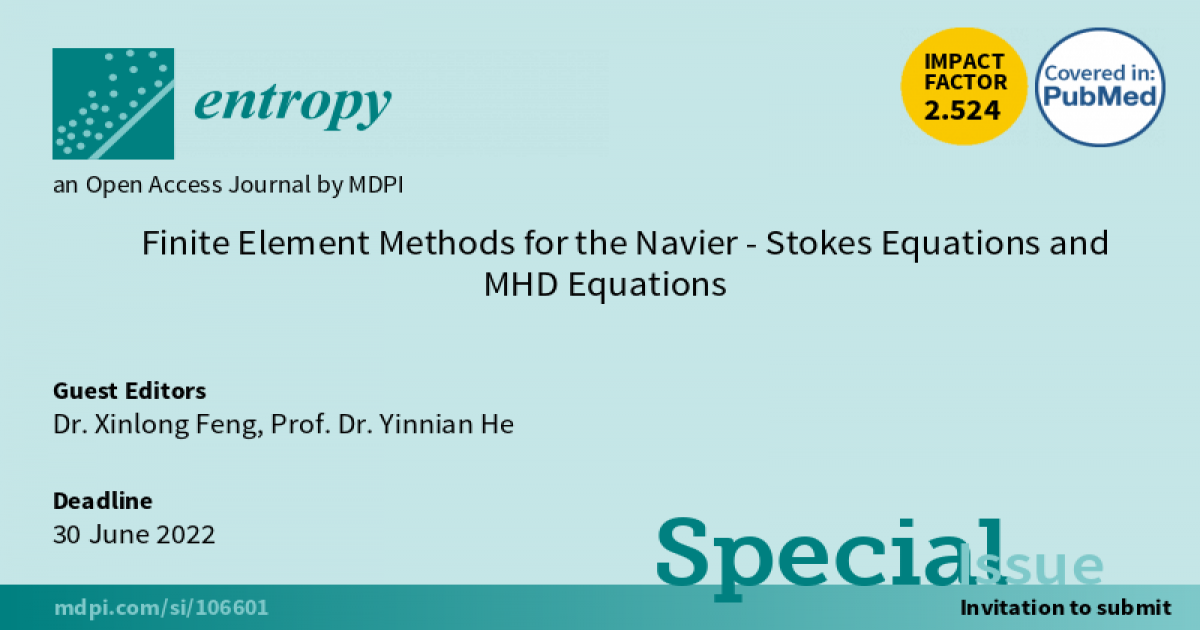Finite Element Methods for the Navier-Stokes Equations and MHD Equations
A special issue of Entropy (ISSN 1099-4300). This special issue belongs to the section "Multidisciplinary Applications".
Deadline for manuscript submissions: closed (30 June 2022) | Viewed by 44307

Special Issue Editors
Interests: numerical methods for PDEs; computational fluid dynamics; computational mathematics; uncertainty quantification; machine learning
Special Issues, Collections and Topics in MDPI journals
Interests: finite element method; finite difference method; Navier-Stokes equations; MHD equations; primitive equations of the ocean; numerical methods for PDEs
Special Issues, Collections and Topics in MDPI journals
Special Issue Information
Dear Colleagues,
The incompressible Navier-Stokes equations reflect the basic mechanical law of viscous fluid flow, which ha important implications in fluid mechanics. This problem is one of the main systems studied in pipe flow, flow around airfoils, blood flow, weather, and convective heat transfer inside industrial furnaces. Therefore, solving the 3D steady and unsteady Navier-Stokes equations is of great significance and application value in the field of scientific research and engineering applications. Lots of works studies have been devoted to this problem, and the finite element methods, finite volume methods, and finite difference methods have been the most successful. Furthermore, the incompressible magnetohydrodynamic (MHD) equations mainly describe the behavior of the macroscopic interaction of electrically conducting fluids and magnetic fields. The MHD equations are determined by the Navier-Stokes equations coupled with the pre-Maxwell equations. The resulting system of numerically solving the MHD equations often requires an unrealistic amount of computing power and storage to properly resolve some MHD flow details. Recently, some numerical methods on the first law and second law of thermodynamics and the concepts of entropy (property) and entropy generation (as measure of process irreversibility) have been discussed.
Considering the recent advances in the field of solving the Navier-Stokes equations and the MHD equations, this Special Issue will collect new ideas and numerical methods arising from the field of analysis and modeling of the Navier-Stokes equations and the MHD equations and some numerical methods on the first law and the second law of thermodynamics and the concepts of entropy (property) and entropy generation (as measure of process irreversibility).
This Special Issue will accept unpublished original papers and comprehensive reviews focused (but not limited to) on the following research areas:
- New mathematical modeling of 3D incompressible Navier-Stokes equations and MHD equations.
- New numerical methods of 2D/3D incompressible Navier-Stokes equations and MHD equations.
- Stability and error analysis of new numerical methods of 2D/3D incompressible Navier-Stokes equations and MHD equations.
- Advanced computational algorithms applied in real problems related to 2D/3D incompressible Navier-Stokes equations and MHD equations.
- The existence, stability, and uniqueness of 3D incompressible Navier-Stokes equations and MHD equations.
- Machine learning for 2D/3D incompressible Navier-Stokes equations and MHD equations.
- Some numerical methods and numerical analysis on the first law and the second law of thermodynamics and the concepts of entropy (property) and entropy generation (as measure of process irreversibility).
Dr. Xinlong Feng
Prof. Dr. Yinnian He
Guest Editors
Manuscript Submission Information
Manuscripts should be submitted online at www.mdpi.com by registering and logging in to this website. Once you are registered, click here to go to the submission form. Manuscripts can be submitted until the deadline. All submissions that pass pre-check are peer-reviewed. Accepted papers will be published continuously in the journal (as soon as accepted) and will be listed together on the special issue website. Research articles, review articles as well as short communications are invited. For planned papers, a title and short abstract (about 250 words) can be sent to the Editorial Office for assessment.
Submitted manuscripts should not have been published previously, nor be under consideration for publication elsewhere (except conference proceedings papers). All manuscripts are thoroughly refereed through a single-blind peer-review process. A guide for authors and other relevant information for submission of manuscripts is available on the Instructions for Authors page. Entropy is an international peer-reviewed open access monthly journal published by MDPI.
Please visit the Instructions for Authors page before submitting a manuscript. The Article Processing Charge (APC) for publication in this open access journal is 2600 CHF (Swiss Francs). Submitted papers should be well formatted and use good English. Authors may use MDPI's English editing service prior to publication or during author revisions.
Keywords
- incompressible navier-stokes equations
- incompressible MHD equations
- finite element method
- finite difference method
- radial basis function
- discontinuous galerkin method
- machine learning
Benefits of Publishing in a Special Issue
- Ease of navigation: Grouping papers by topic helps scholars navigate broad scope journals more efficiently.
- Greater discoverability: Special Issues support the reach and impact of scientific research. Articles in Special Issues are more discoverable and cited more frequently.
- Expansion of research network: Special Issues facilitate connections among authors, fostering scientific collaborations.
- External promotion: Articles in Special Issues are often promoted through the journal's social media, increasing their visibility.
- Reprint: MDPI Books provides the opportunity to republish successful Special Issues in book format, both online and in print.
Further information on MDPI's Special Issue policies can be found here.







